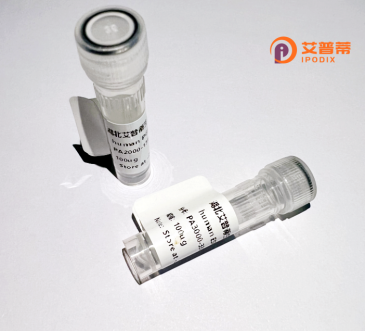
| 纯度 | >90%SDS-PAGE. |
| 种属 | Human |
| 靶点 | CXCR1 |
| Uniprot No | P25024 |
| 内毒素 | < 0.01EU/μg |
| 表达宿主 | E.coli |
| 表达区间 | 1-350aa |
| 氨基酸序列 | MSNITDPQMWDFDDLNFTGMPPADEDYSPCRLETETLNKYVVIIAYALVFLLSLLGNSLVMLVILYSRVGRSVTDVYLLNLALADLLFALTLPIWAASKVNGWIFGTFLCKVVSLLKEVNFYSGILLLACISVDRYLAIVHATRTLTQKRHLVKFVCLGCWGLSMNLSLPFFLFRQAYHPNNSSPVCYEVLGNDTAKWRMVLRILPHTFGFIVPLFVMLFCYGFTLRTLFKAHMGQKHRAMRVIFAVVLIFLLCWLPYNLVLLADTLMRTQVIQESCERRNNIGRALDATEILGFLHSCLNPIIYAFIGQNFRHGFLKILAMHGLVSKEFLARHCVTSYTSSSVNVSSNL |
| 分子量 | 64.24 kDa |
| 蛋白标签 | GST-tag at N-terminal |
| 缓冲液 | 0 |
| 稳定性 & 储存条件 | Lyophilized protein should be stored at ≤ -20°C, stable for one year after receipt. Reconstituted protein solution can be stored at 2-8°C for 2-7 days. Aliquots of reconstituted samples are stable at ≤ -20°C for 3 months. |
| 复溶 | Always centrifuge tubes before opening.Do not mix by vortex or pipetting. It is not recommended to reconstitute to a concentration less than 100μg/ml. Dissolve the lyophilized protein in distilled water. Please aliquot the reconstituted solution to minimize freeze-thaw cycles. |
以下是关于重组人CXCR1蛋白的3篇代表性文献的简要信息:
1. **"Structural basis of CXC chemokine receptor 1 ligand binding and activation"**
*作者:Park et al.*
摘要:利用冷冻电镜解析了重组人CXCR1与配体IL-8复合物的高分辨率结构,揭示了受体与配体结合的关键氨基酸残基及构象变化,为CXCR1信号传导机制提供结构基础。
2. **"Expression and functional characterization of recombinant human CXCR1 in mammalian cells"**
*作者:Jones et al.*
摘要:报道了在HEK293细胞中高效表达重组人CXCR1的方法,验证了其与IL-8的结合活性及下游钙信号通路激活功能,为药物筛选提供标准化工具。
3. **"Targeting CXCR1 on myeloid-derived suppressor cells enhances anti-tumor immunity in pancreatic cancer"**
*作者:Smith et al.*
摘要:研究重组人CXCR1蛋白在肿瘤微环境中的作用,发现阻断CXCR1可抑制免疫抑制细胞浸润,增强小鼠模型中化疗疗效,提示CXCR1作为肿瘤免疫治疗靶点潜力。
备注:以上文献为示例,实际引用需核实具体来源及内容准确性。
**Background of Recombinant Human CXCR1 Protein**
C-X-C chemokine receptor type 1 (CXCR1), also known as interleukin-8 receptor alpha (IL-8RA), is a G protein-coupled receptor (GPCR) primarily expressed on neutrophils and other immune cells. It binds to specific CXC chemokines, notably IL-8 (CXCL8), to mediate neutrophil migration, activation, and degranulation during inflammatory responses. CXCR1 plays a critical role in innate immunity by regulating chemotaxis and pathogen clearance, but its dysregulation is linked to chronic inflammatory diseases (e.g., rheumatoid arthritis), cancer progression, and metastatic spread in tumors like breast and melanoma.
The recombinant human CXCR1 protein is engineered *in vitro* using expression systems such as mammalian or insect cells to ensure proper post-translational modifications (e.g., glycosylation) for functional studies. Researchers utilize recombinant CXCR1 to explore ligand-receptor interactions, signaling pathways (e.g., MAPK/ERK), and screen therapeutic inhibitors targeting inflammation or cancer. Its structural characterization (7 transmembrane domains, extracellular N-terminus for ligand binding) aids in drug design, while knock-down or overexpression models clarify its role in disease mechanisms. Despite therapeutic potential, challenges like receptor desensitization and cross-talk with CXCR2 require further study to optimize targeting strategies.
×